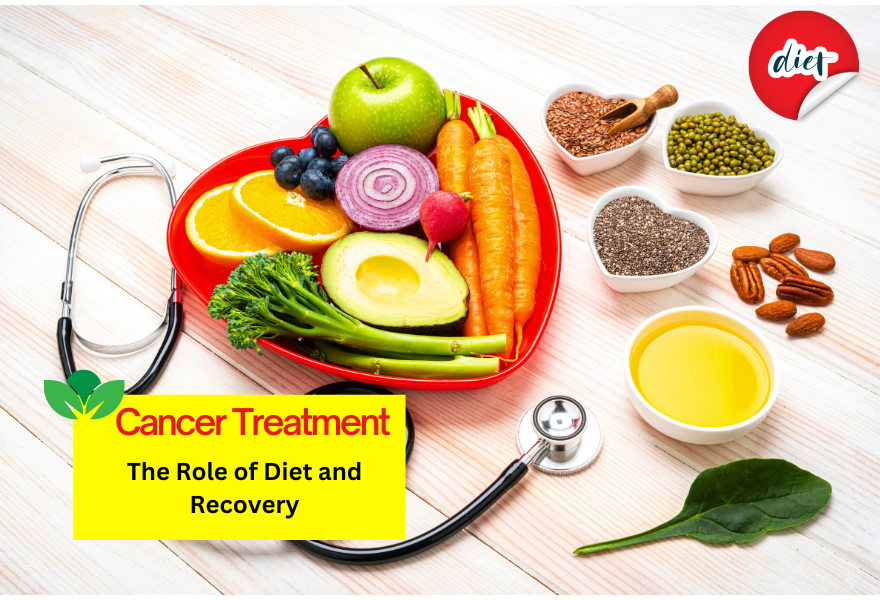BLOG
The Role of Diet in Cancer Treatment and Recovery

Cancer, a complex and multifaceted disease, affects millions of people worldwide. While medical treatments such as chemotherapy, radiation, and surgery remain the primary methods of combating cancer, the role of diet in cancer treatment and recovery is increasingly recognized as vital. An optimal diet can help strengthen the body, manage side effects, and enhance the overall effectiveness of treatment. This blog explores the crucial role of diet in cancer care, offering insights into the best dietary practices for those undergoing treatment and recovery.
Understanding the Connection Between Diet and Cancer
Diet plays a significant role in cancer prevention, treatment, and recovery. Certain foods can support the body’s immune system, reduce inflammation, and provide essential nutrients that aid in the healing process. Conversely, a poor diet can contribute to weakened immunity, increased inflammation, and a slower recovery.
The Importance of Nutrient-Dense Foods
For individuals battling cancer, nutrient-dense foods are essential. These foods provide vitamins, minerals, and other vital nutrients without excessive calories. Key nutrient-dense foods include:
- Fruits and Vegetables: Rich in vitamins, minerals, and antioxidants, fruits and vegetables can help combat oxidative stress and inflammation. Cruciferous vegetables like broccoli, Brussels sprouts, and kale are particularly beneficial due to their high levels of cancer-fighting compounds.
- Whole Grains: Foods like brown rice, quinoa, and oats provide fiber and essential nutrients, helping maintain energy levels and digestive health.
- Lean Proteins: Protein is crucial for maintaining muscle mass and repairing tissues. Sources include poultry, fish, beans, and legumes.
- Healthy Fats: Omega-3 fatty acids, found in fatty fish, flaxseeds, and walnuts, can help reduce inflammation and support overall health.
Specific Dietary Recommendations for Cancer Patients
While general dietary principles apply, cancer patients may have specific nutritional needs depending on their treatment and type of cancer. Here are some tailored dietary recommendations:
Managing Side Effects with Diet
Cancer treatments often cause side effects such as nausea, loss of appetite, and mouth sores. Adjusting the diet can help manage these symptoms:
- Nausea: Small, frequent meals and bland foods like crackers, toast, and ginger tea can help alleviate nausea.
- Loss of Appetite: Nutrient-rich smoothies and shakes can be easier to consume and provide essential nutrients.
- Mouth Sores: Soft, moist foods such as yogurt, applesauce, and scrambled eggs can be soothing and easier to eat.
Boosting the Immune System
A strong immune system is crucial for fighting cancer and recovering from treatment. Foods that boost immunity include:
- Citrus Fruits: High in vitamin C, fruits like oranges, lemons, and grapefruits can strengthen the immune system.
- Garlic and Onions: These contain compounds that have been shown to enhance immune function.
- Probiotic-Rich Foods: Yogurt, kefir, and fermented foods like sauerkraut can support gut health and, in turn, overall immunity.
The Role of Hydration
Staying well-hydrated is essential for cancer patients, as treatments can lead to dehydration. Water, herbal teas, and broths are excellent choices. Hydration helps the body flush out toxins, maintain energy levels, and support overall well-being.
Supplements and Cancer Treatment
While a balanced diet should provide most necessary nutrients, some cancer patients may require supplements to address deficiencies or support specific needs. Common supplements include:
- Vitamin D: Often recommended for its potential role in cancer prevention and immune support.
- Fish Oil: Rich in omega-3 fatty acids, it may help reduce inflammation.
- Probiotics: To support gut health, especially if the patient is undergoing treatments that affect digestion.
It’s important to consult with a healthcare provider before starting any supplements, as some may interact with cancer treatments.
Avoiding Harmful Foods
Certain foods can be detrimental to cancer patients and should be limited or avoided:
- Processed Foods: High in unhealthy fats, sugars, and preservatives, processed foods can contribute to inflammation and overall poor health.
- Red and Processed Meats: These have been linked to an increased risk of certain cancers and should be consumed in moderation.
- Alcohol: Excessive alcohol consumption can weaken the immune system and interfere with treatments.
Personalized Nutrition Plans
Every cancer patient is unique, and dietary needs can vary widely. Working with a registered dietitian who specializes in oncology can help create a personalized nutrition plan tailored to the individual’s specific needs, treatment plan, and preferences.
Conclusion
Diet plays a pivotal role in cancer treatment and recovery. By focusing on nutrient-dense foods, managing side effects with appropriate dietary choices, staying hydrated, and avoiding harmful foods, cancer patients can support their overall health and improve their quality of life. Collaboration with healthcare providers to create a personalized nutrition plan can further enhance the effectiveness of cancer treatment and promote a smoother recovery journey. Prioritizing a healthy diet is not just a complementary approach but a fundamental part of holistic cancer care.More

